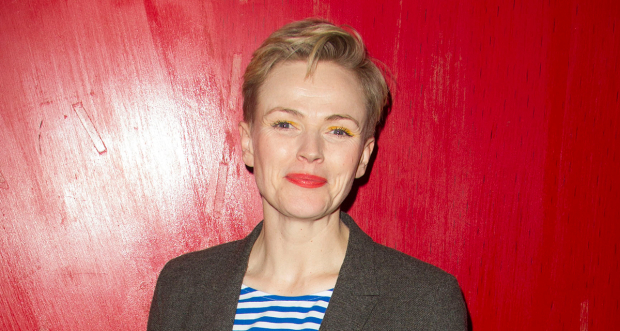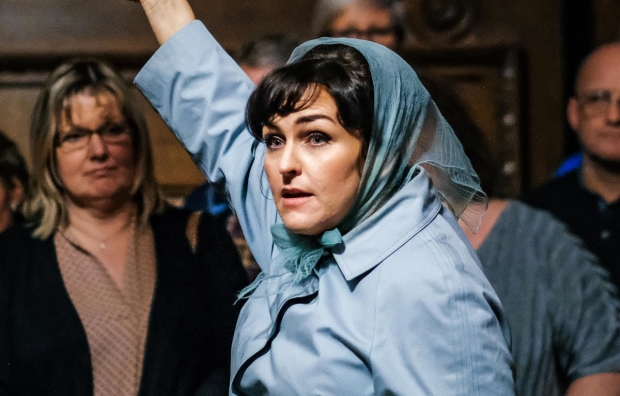Maxine Peake on the extraordinary story of Lillian Bilocca
As her latest play opens in Hull, the actress talks about the remarkable woman who inspired it

© Dan Wooller for WhatsOnStage
You’ll probably know Maxine Peake from TV roles such as barrister Martha Costello in Silk, Twinkle in Dinnerladies and Veronica Ball in Shameless. But she’s been starring in leading roles on stage too for the last 20 years. And she has tackled some of the most iconic roles for women – and men – in the canon, from Miss Julie and Blanche DuBois to Hamlet. In fact, it’s rare that an actor gets the chance to play both Ophelia and Hamlet in their lifetime, but Peake has, which is testament to her raw, engaging depth as a performer. In 2014 she began to write, penning radio play Beryl which was then turned into a stage piece. Now she’s about to open another play – The Last Testament of Lillian Bilocca – which is one of the centrepieces in the Hull City of Culture final line-up. Here she explains more about the project.
Who was Lillian Bilocca?
Lillian was born in Hessle Road in Hull and worked on the fish stall, packing and gutting fish. Her husband was a merchant seaman and her son was a trawlerman and in 1968, two big fishing trawlers sunk in the space of around ten days [all 20 hands went down with the ship]. She decided enough was enough, and started a petition, walking the streets, and getting people to help her. She went to Westminster with three other women to lobby the trawler owners to change the legislation [over safety on the ships]. People used to call her Big Lil, but one of the things I’ve tried to do in the play is get rid of that name. People meant it affectionately, but I’m not sure it’s nice. She was a tall, larger lady, beautiful, she should have been in a Fellini film.
Was she successful?
She was, but part of the reason was that a third trawler went down when they were at Westminster. It’s a really tragic story. After that Lillian became a bit of a spearhead of the movement. She went round the country doing talks at universities and student unions and labour groups. But she became a little vilified by the community. I think it was because she was very straight talking and the community was a little concerned. The Hessle Road was very closed-off and I think they felt she was giving a bad view of what the people on it were like.

© Andrew Billington Photography
It’s astonishing that she was so galvanised to act like that…
The community was so tight-knit – if it wasn’t your family affected, it was your neighbours' or friends'. It’s very relevant to today, because it was essentially zero hours contracts. If you fell out with the skipper, or something happened, you didn’t get on the trawler for that voyage and that was you out of work for three weeks. There was no sick pay or holiday pay. It really shocked me that this was 1968. You’d have thought things would be a bit more advanced, but no – it was very feudal.
Why stage the show in the Guildhall in Hull?
The show is about Hull, which was built on fish and on the lives of these men and it’s such a beautiful building. There’s a spectacular collection of civic buildings in Hull, really beautiful buildings that have been built on tragedy. So for one night, we are able to go in, we’re able to take over the Guildhall. It really adds to the piece – which is promenade, so we move from room to room. The council has been so accommodating as well. We thought they’d say: 'Under no circumstances'.
You’re mainly known as an actor, what made you turn to writing?
When I was ten, I wanted to be a comedian. My big heroes were people like Victoria Wood and Ronnie Barker. I applied to drama school for two years, but didn’t get in, and I remember thinking: 'I’m going to have to go to university instead and maybe I’ll do writing'. But then I did get into RADA. I became friends with Sally Hawkins and we used to write improv stuff together. Diane Morgan and I became friends when we were 18 too and we’d write bits and pieces together. Although we never took them anywhere, just did them in Diane’s bedroom. It was when I wanted to be in a radio play about Beryl Burton, the producer said – why don’t you write it?
And it snowballed from there?
It’s only ever been people asking me to write something, rather than me sitting down and writing something. I’m quite looking forward to writing something just because I want to. It’s about having a bit more control and creative output – I had a lot of discussions with other female actors who said the words weren’t out there for them. So I said maybe we should start writing something. That was one of the main driving forces: it's because I’ve got all these brilliant mates who don’t work as much as they should.
The Last Testament of Lillian Bilocca runs at the Guildhall in Hull until 18 November.















